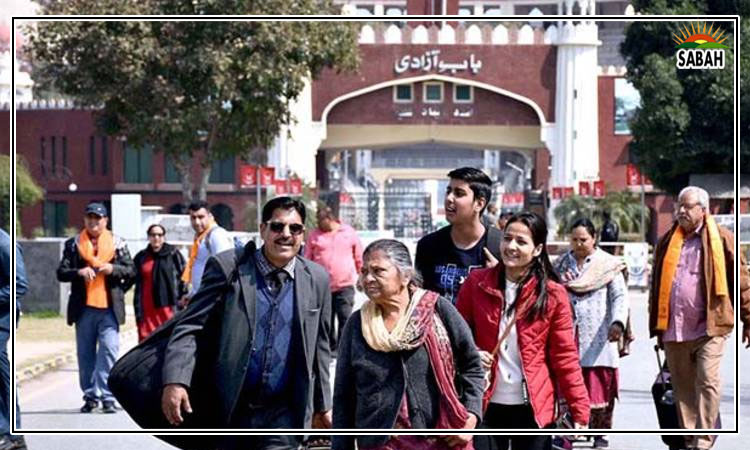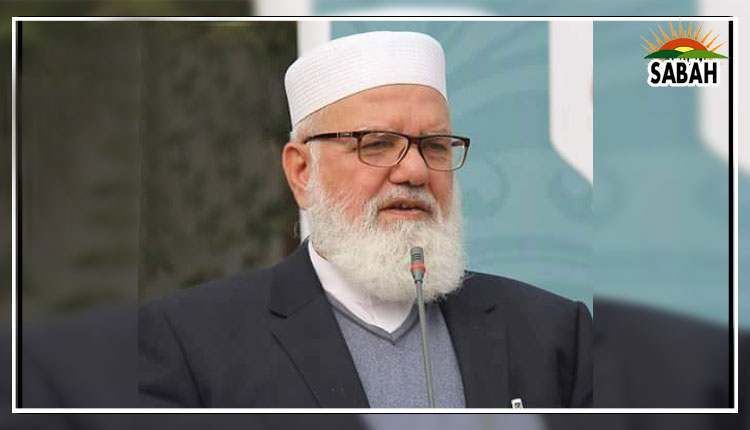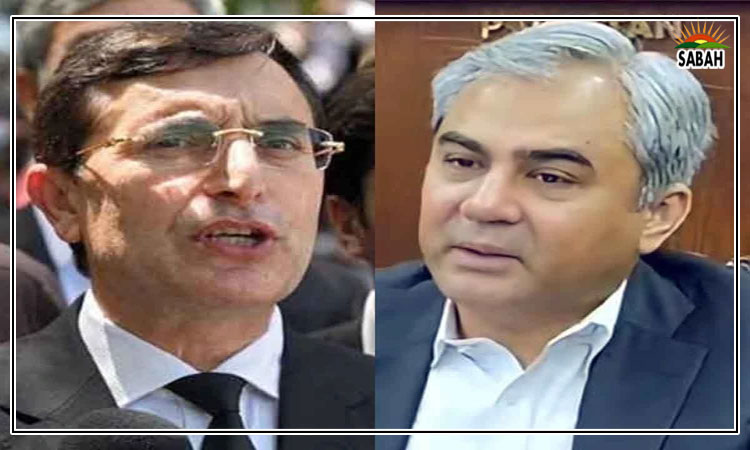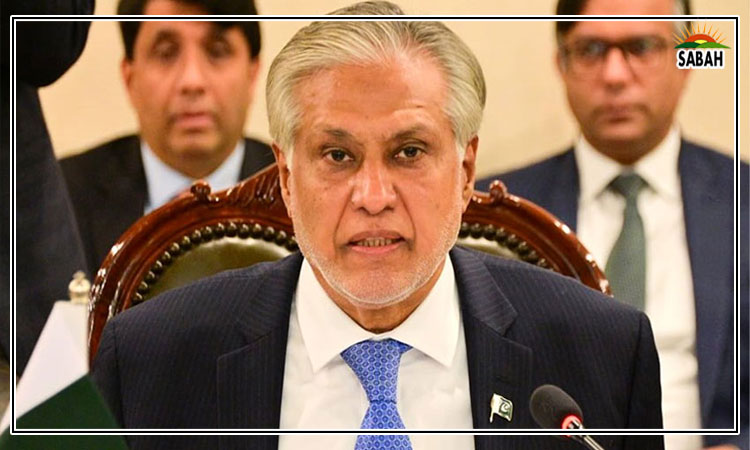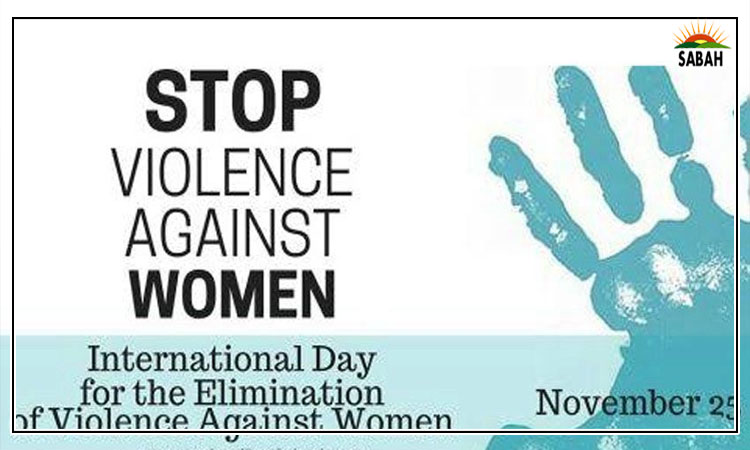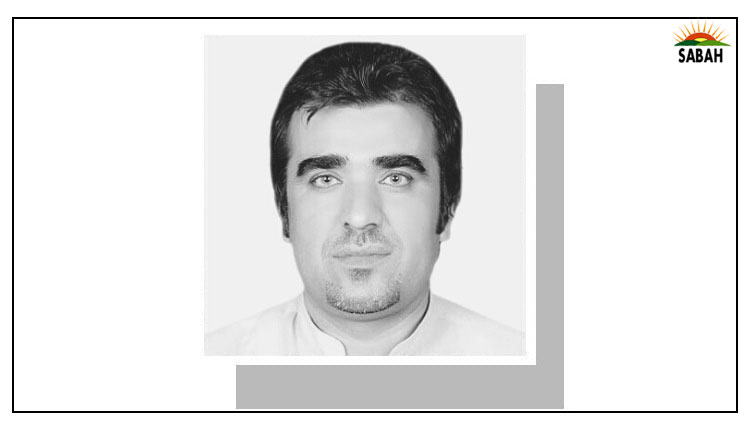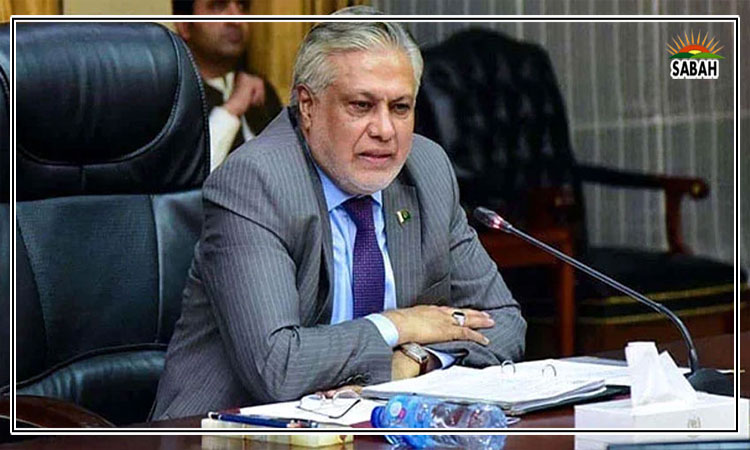Communication & dialogue are essential for reducing the current & future risks: Ishaq Dar
ISLAMABAD, June 25 (SABAH): Deputy Prime Minister and Foreign Minister Senator Mohammad Ishaq Dar says communication and dialogue are essential for reducing the current and future risks and for fostering a collaborative approach to caters to the needs of all nations.
Addressing a ceremony at the Institute of Strategic Studies Islamabad (ISSI) on Tuesday, Ishaq Dar said Pakistan firmly supports an approach that prefers cooperation over confrontation and an approach that is built on reaffirmation of faith in and commitment to the UN Charter and international law.
The Foreign Minister said Pakistan remains a strong proponent of the inextricable link between peace and development. He said within this framework, Pakistan has consistently strived to have peaceful, cooperative and good-neighbourly relations with all countries in our immediate and extended neighborhoods.
Shedding light on all-weather strategic relations with China, the Deputy Prime Minister said China is the most trusted and reliable friend of Pakistan. He said our all-weather strategic cooperative partnership with China is the cornerstone of Pakistan’s foreign policy.
Ishaq Dar said the recent visit of Prime Minister Shehbaz Sharif to China and his deep consultations with the Chinese leadership have resulted in reaffirming the strategic importance the two countries attach to this relationship and to the pivotal role of CPEC.
Turning to Afghanistan, Ishaq Dar said a peaceful, stable, united, and prosperous Afghanistan is in Pakistan’s vital interest. He said apart from emphasizing inclusive governance and respect for the rights of all Afghans, Pakistan stresses the imperative need to ensure that Afghanistan’s soil is not used for terrorism against any state.
The Foreign Minister said Pakistan earnestly hopes the Afghan Interim authorities would see that it is in their own enlightened self-interest to heed this call and take the practical steps needed to address our serious concerns.
About Indian Illegal Occupied Jammu and Kashmir (IIOJK), Ishaq Dar said India’s illegal and unilateral actions of 5 August 2019 had adversely affected the environment of bilateral relations.
The Foreign Minister said the onus remains on India to take necessary steps to create an enabling environment for purposeful engagement and result-oriented dialogue on all issues.
About relations with the United States, he said a stable, cooperative and durable relationship with the United States is of immense importance.
He said Pakistan is equally conscious of the imperative of having good relations with all major powers. The Foreign Minister said we are also working to forge closer cooperation with Russia, European Union, Japan, and ASEAN.
He said this would help Pakistan navigate the complexities of today’s geo-politics and advance its goals of economic security and development.
Ishaq Dar said that it is a real pleasure and privilege to participate in the 51st Foundation Day commemoration of the Institute of Strategic Studies Islamabad (ISSI).
He said that since its establishment in 1973, the Institute has made impressive strides and has become a premier think-tank in Pakistan. The Institute is widely recognised for its quality research and as an inclusive platform for multi-stakeholder dialogue.
He said that the Foreign Office deeply appreciates ISSI’s role in strengthening the linkage between the research and policy communities. It enriches the policy process on a range of strategic and foreign policy issues.
He said that there are ongoing wars in Europe and the Middle East:
* A genocide of Palestinian children and women in Gaza;
* Raging and simmering military conflicts in several Continents;
* Long-standing unresolved political disputes from Palestine to Kashmir;
* Near collapse of the painstakingly built arms control regimes and intensification of arms races in the nuclear and conventional domains;
* Unprecedented growth and militarisation of new and critical technologies; mainstreaming of far-right extremist ideologies and populist politics;
* Interlocking food and fuel crises accentuated by the global pandemic and growing geo-political tensions; rise of pernicious phenomena like Islamophobia; and
* Exponential increase in disinformation and ‘grey zone’ conflict; and the existential threat of climate change.
Ishaq Dar said that at the same time, we are witnessing the weakening of commitment to the purposes and principles of the UN Charter and the international law.
Isahq Dar said that to our east, the relationship with India has historically remained troubled. Pakistan does not believe in perpetual hostility. We seek good-neighbourly relations with India on the basis of mutual respect, sovereign equality, and a just and peaceful resolution of the long-standing Jammu and Kashmir dispute.
Ishaq Dar said that while Pakistan has always been receptive to constructive engagement through dialogue that includes all outstanding issues, Pakistan would never agree to unilateral approaches or attempts to impose India’s will or hegemony.
Ishaq Dar said we will also take every step needed to maintain strategic stability in South Asia and would respond effectively and decisively to any ill-considered military misadventure by the ‘Hindutva’ driven dispensation in New Delhi.
Ishaq Dar said that in our view, as the BJP-led NDA government starts a new term, it is time for a sober reflection on the future of India-Pakistan relations and the cross-cutting issues affecting the entire region.
He said that India’s illegal and unilateral actions of 5 August 2019 had adversely affected the environment of bilateral relations. The onus remains on India to take necessary steps to create an enabling environment for purposeful engagement and result-oriented dialogue on all issues.
He said that in this context, it is equally important that India eschews its relentless smear campaign against Pakistan, desists from its state-sponsorship of terrorism and extrajudicial killings inside Pakistan, and takes tangible steps to move the relationship in a positive direction.
Ishaq Dar said that South Asia is home to more than one-fifth of humanity. The region is beset by daunting challenges including poverty, unemployment, illiteracy, disease, food insecurity, water scarcity, natural disasters, environmental degradation, and effects of climate change.
Ishaq Dar said that Rather than fight with each other, it would be prudent for the South Asian nations to combat these challenges. We are not only the least economically integrated region, but also one with the lowest rankings on almost all indices of human development.
He said that the South Asian Association for Regional Cooperation (SAARC), the only viable platform for regional cooperation and tackling these myriad challenges, remains stymied due to obstinacy of one member state.
He said that the political leadership in South Asia owes it to its peoples and future generations to act with prudence and turn a new page in regional relations and mutual cooperation.
Ishaq Dar said that within the neighbourhood, Pakistan has its most trusted and reliable friend, China. Our all-weather strategic cooperative partnership with China is the cornerstone of Pakistan’s foreign policy.
He said that it is also a factor of stability in the region and beyond. The China Pakistan Economic Corridor is a transformational project contributing both to Pakistan’s economic turnaround as well as regional prosperity.
Ishaq Dar said that the Prime Minister’s recent visit to China and his deep consultations with the Chinese leadership have resulted in reaffirming the strategic importance the two countries attach to this relationship and to the pivotal role of CPEC. He said that upon successful completion of 10 years of CPEC, we have jointly agreed to pursue its upgraded version in the coming years. Essentially, our focus would be on industrialisation, digitalisation, green transition, agriculture, and people-to-people exchanges.
Ishaq Dar said that we will do everything possible to ensure safety and security of Chinese personnel and projects in Pakistan and to safeguard CPEC against the machinations of inimical forces. The Pakistan-China relationship would continue to stand tall and serve the best interests of our two nations.
Ishaq Dar said that our endeavours to forge deeper partnerships with other neighbours including with Iran, with our fraternal Gulf Arab nations, with Türkiye, and with Central Asian States and Azerbaijan, will continue apace.
Ishaq Dar said that our primary focus is on forging closer trade and investment ties and increasing regional connectivity. In this regard, the Special Investment Facilitation Council (SIFC) is playing a significant role.
Ishaq Dar said that in this troubled world, the guiding principle for our foreign policy is to optimally enhance Pakistan’s diplomatic space and room for autonomous action.
Ishaq Dar said that in this context, a stable, cooperative and durable relationship with the United States is of immense importance. Pakistan is equally conscious of the imperative of having good relations with all major powers.
He said that as such, beyond the U.S. and China, we are working to forge closer cooperation with Russia, European Union, Japan, and ASEAN. This would help Pakistan navigate the complexities of today’s geo-politics and advance its goals of economic security and development.
He said that in fact, Pakistan’s ‘pivot to geo-economics’ is primarily aimed at realising the potential of Pakistan’s geo-strategic location and forging development partnerships with all key actors.
Ishaq Dar said that we are acutely aware that this is an expansive foreign policy agenda, requiring every ounce of resources that we can mobilise. We are also aware that external influence is contingent upon internal strength.
He said that the foreign policy, indeed, rides on the twin pillars of political stability and economic growth. Our endeavours on these counts would continue in order to ensure that Pakistan not only realises its full potential as a nation-state but also fulfils its destiny as a force for good at the global level.
He said that Pakistan’s recent election as a member of the UN Security Council for the term 2025-26 offers another valuable opportunity to us to make our rightful contribution to international peace and security.
Ishaq Dar said that with these words, I thank the ISSI for this valuable opportunity to share my thoughts with this august gathering. I also congratulate the ISSI leadership for imparting new vision and vigour to the Institute’s work. He said that the need for disseminating Pakistan’s narratives is of utmost importance and ISSI is an important platform which plays a seminal role in this regard.



